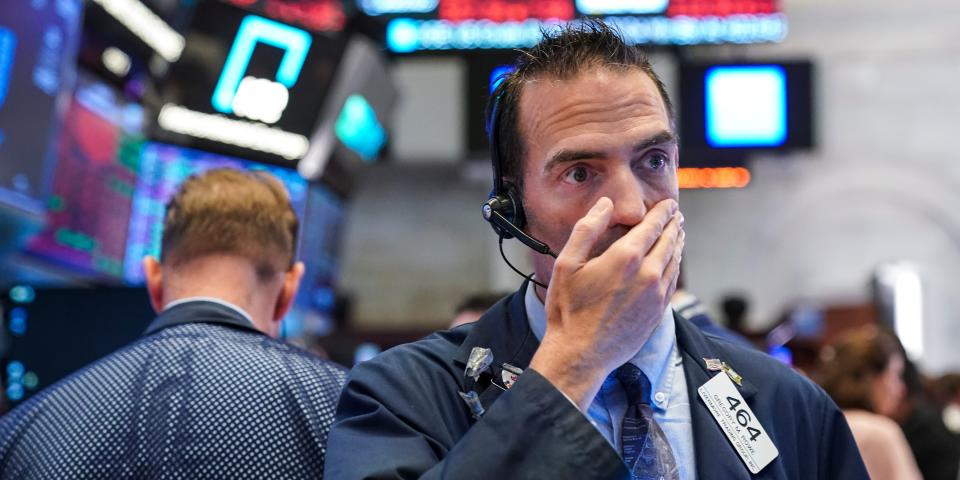September is historically considered the worst month of the year for stocks, in what is known as the “September Effect.”
But this year, market experts appear divided over whether US equities will repeat the pattern or defy it.
Here’s where 5 top voices see stocks heading in September and ahead.
September has historically been a weak month for stocks, although there’s no real explanation for the pattern beyond statistical seasonality. The phenomenon even has a nickname: “The September Effect.”
Since 1945, the S&P 500 has dropped 0.7% on average during the ninth month of the year, data from CFRA Research shows, with little consensus on why. So far this month, the benchmark index has fallen more than 1%.
Market experts remain split on whether US equities will repeat the pattern. Some, including economist Ed Yardeni are gearing up for poor results, while others think the market will be able to buck the trend this time.
Here’s where stocks are headed in September and ahead, according to 5 top voices.
Ed Yardeni, president of Yardeni Research
“On Sunday, we observed that September is a good month for picking apples. It is widely viewed as a rotten month for stocks, which has been true for 55% of Septembers since 1928,” Yardeni said in a note to clients.
But despite September being an unfortunate month for stocks, it’s also a good opportunity to invest in cheap equities before a typical “year-end Santa Claus rally”, according to him.
Among things that could go wrong for investors this month, Yardeni highlighted rising oil prices, inflation risks, and China’s faltering economy.
Tom Lee, head of research at Fundstrat
On a more optimistic note, Fundstrat’s Tom Lee noted three reasons why the stock market could hold up in the historically weak month of September.
The first is down to his analysis of seasonal trends. According to Lee, since 1950 there have been eight months when stocks were up more than 10% in through August but down in the first three days of September. In five of those eight months, stocks finished higher for the rest of September.
“That’s why I don’t think you should lose hope,” he said.
Investor positioning trends in the option market also suggests that “we’re nearing the end of this sell-off,” Lee said, referring to the declines in US equities since the start of August.
Furthermore, falling used-car prices indicate that inflation pressures are easing, he added. That could in turn reduce pressure on the Federal Reserve to raise interest rates further – a prospect that would be favorable for stocks.
“So bottom line: rough start to the month. It’s unfortunate, rather seeing us be strong for the first three days [of September], but the fact that it’s down doesn’t mean the rest of the month is a write off,” Lee said.
Bank of America
“The best setup for both September and the rest of the year is when the S&P 500 rallies between 10% and 20% from January to August,” Bank of America technical strategist Stephen Suttmeier said in a note seen by Insider. The benchmark index gained about 17% during the first eight months of 2023.
“This is the scenario for 2023,” Suttmeier added. An AI-powered rally so far this year has helped boost stocks in what signals further rallies again, he continued.
Jeremy Siegel, “Wizard of Wharton”
Beyond September, Siegel weighed in on the long-term trajectory of stocks. He said the US stock market is on firm ground, and the housing market is fighting off the surge in mortgage rates for now.
“Equities can hold in here,” the Wharton professor said on the “Behind the Markets” podcast earlier this month. That’s because inflation is falling, meaning the Fed is less likely to hike interest rates.
“The likelihood that the Fed will raise in September is now almost nil, and in fact it puts the November increase in doubt,” he added, referring to the central bank’s upcoming policy meetings.
David Rosenberg, founder of Rosenberg Research
In contrast, top economist Rosenberg has long-warned about a looming crash in in stocks. He predicted the US economy is set to crater by spring, causing a 25% plunge in the S&P 500.
“If this recession hasn’t happened by the first quarter of next year,” he recently said on the WTFinance podcast, “I will wipe the egg off my face, and I’ll write a report saying, ‘I was wrong, the business cycle has been repealed after all.”
He added that Americans are running out of their pandemic savings, while student-debt repayments are set to choke consumers even more. “I think the batteries are going to run out,” Rosenberg said. “A consumer recession is inescapable, it’s only going to be a question of how bad, not whether,” he added.
Read the original article on Business Insider
Credit: Source link




